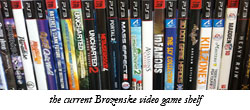What We're Reading Now
11 June 2011
Rachel just finished reading Reality Is Broken: Why Games Make Us Better and How They Can Change the World by Jane McGonigal. (If you've been looking for an excuse to get wrapped up in a game, look no further.)
Tags:
There are a number of things that it sometimes surprises people to learn about me. My first words were "Donald Duck." I don't know how to ride a bicycle. And ever since being introduced to them by my now-husband nearly nine years ago, I've become something of a video game aficionado. In the past year, I've taken up keyboards in Rock Band 3, devoted hours to completing Final Fantasy XIII, played with physics in Portal 2, created gameplay levels in Little Big Planet and, well, you get the picture. But even as I've become more proficient and developed my gameplay skills (and trust me, there are some skills), I've considered the time spent holding a controller as mostly entertaining and purely frivolous.

Thanks to the work of McGonigal, I'm now able to look at games—from tic-tac-toe to World of Warcraft—in a new light. The argument starts with her basic definition of a game as an experience with a goal, rules, a feedback system and voluntary participation. When we play a game, we engage in a voluntary attempt to overcome unnecessary obstacles. Described that way, games start to sound a lot like, well, a job that you might actually want to get up for every morning. In fact, McGonigal posits, games provide mechanisms for players to engage in the seven types of work we seek at different times: high-stakes work with thrilling success and terrifying risk, busywork that provides predictable pathways to productivity, mental work that activates our cognitive faculties, physical work that releases endorphins and wears us out, discovery work that taps curiosity and instills confidence, teamwork that emphasizes collaboration and cooperation, and creative work that allows us to make meaningful decisions and feel proud of something we've made.
At this point, it probably won't surprise you to know that I was pretty intrigued by what I was reading. With this model of looking at games and work, managers and leaders have a whole new toolset to think about how to shape meaningful roles for employees and tap into a whole new energy in the workplace. It syncs up with what we've learned from Dan Pink in Drive and the Heath brothers in Switch and pretty much everyone who's writing about new findings in neuroscience and positive psychology. If we could tap the almost-magnetic draw of games by re-thinking the ways we structure work, it would definitely change our organizations, if not the world at large. (As McGonigal points out, World of Warcraft players have spent a combined 5.93 million years at work in the WoW universe. All voluntarily.)
I'll be honest. I was a little disappointed by McGonigal's application of her insights into the power of games. Rather than provide advice about how to use sound game-design skills in the real world, she's spent most of her personal and professional energy developing alternate reality games for organizational and social good. Some of those games, such as a simulation of an oil-starved future, did activate a devoted core of interested gamers and result in important breakthrough thinking that shape social policy and might indeed change the world. But as much as I might consider myself an emerging gamer, I have a hard time picturing a future in which I'm looking for a fulltime virtual life. I'd rather take what we can learn about good games and incorporate it into the design of the real world.
So don't be alarmed if I ask you about the clarity of your goals or the efficacy of your feedback systems, or start talking about the excitement of a spectacular failure. In the meantime, I'm going to go play a game. Maybe Uncharted 2 — I think I might be in the mood for some high-stakes discovery.







Comments
Our Comment Policy:
Our blog posts are only half of the conversation. What our readers have to say is equally important to us, and we're grateful for all the comments that continue the dialog.
To ensure that the discussion here is as useful as possible to all of our readers, please be respectful of our contributors and refrain from harassing, threatening and/or vulgar language. We reserve the right to screen and remove any comments from the site. If you have a question about a comment or want to discuss our policy, please contact us. We'll talk it over.
There are no comments for this entry yet.